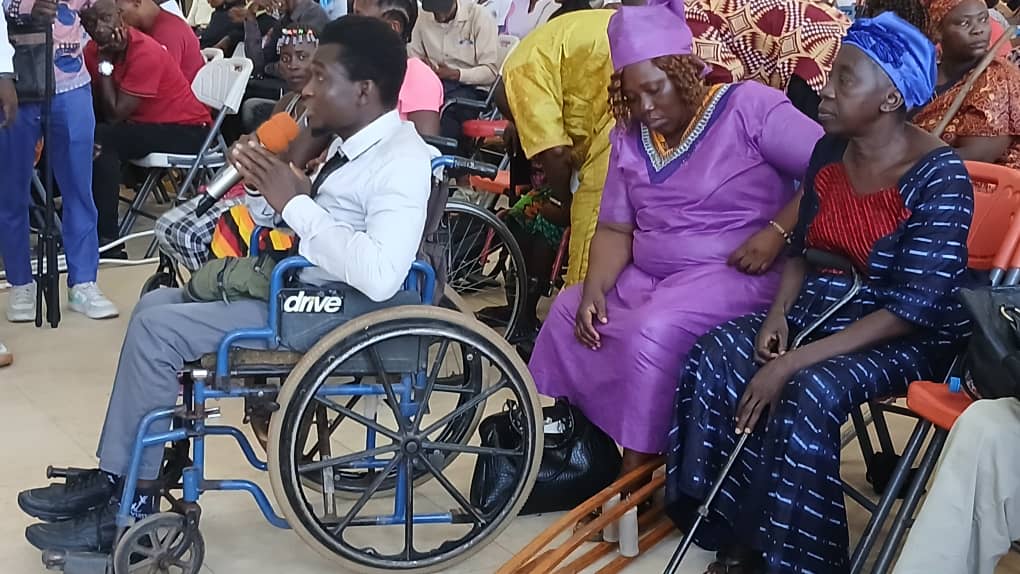By Alfred Koroma

A final-year student studying Laboratory Medicine at the College of Medicine and Allied Health Sciences (COMAS) has raised concern about being denied access to laboratories despite being in final year.
Seated in his wheelchair in a crowded basement of the City Hall building, Santigie Alpha Kamara said from first year, on to final year, he has never been granted the opportunity to do practical sessions in the lab because of his condition.
And he has been through lots of struggle since he made the choice to study in the institution which he described as unfriendly for persons with disabilities.
“At first, I struggled to get admitted into the College due to my condition. Finally, I was accepted for a diploma Program in Laboratory Medicines,” he Santigie said.
“I have endured a lot. It is only that I like what I’m doing that is the reason I’m still in the College,” he added:
“But now my fear here is, I’m in my final year. I shall be graduating as a Lab Technician, but still, I’ve not been able to access the laboratory to do practicals due to my condition.”
Santigie was speaking at a Town Hall meeting on Thursday, an event attended by the Minister of Health and Sanitation, Dr Austin Demby, Minister of Technical and Higher Education, Dr. Haja Ramatulai Wurie, and other top officials, including the UN Resident Coordinator, Seraphine Wakana, Minister of Social Welfare, Mrs Melrose Karminty who organised the Town Hall for a frank dialogue with the disability community.
COMAHS is one of the three constituent colleges in the University of Sierra Leone charged with the primary mandate to produce laboratory technicians, biomedical scientists, doctors, nurses and pharmacists with a view of improving the health care delivery system in the country.
Since those programs have to do with dealing with life and death, practical sessions for students are more crucial. As a result, many COMAHS students often spend much of their time at major hospitals or health centers doing practicals and preparing for real-world application.
But Santigie alleges that his lack of access to lab stems from the unfriendly infrastructure of the University and a failure to accommodate students with disabilities.
He said he has been told that the lab setup isn’t designed for someone like him.
Each time I ask, he said, they tell me the laboratory desk is high for even those who are able to stand let alone talk of me who cannot stand.
“A worker I don’t want to name told me they cannot get a person to make a desk for me,” he added, asking:
“How would I endure when I graduate, but I’m not able to do anything in relation to what I studied?”
As his graduation nears, the disabled student palpably sounds worried that his dream of becoming a laboratory professional is slipping away, invoking a feeling of regret in him.
“I’m looking at it that maybe I made the wrong choice. I should not have gone into the medical field, he said.“I’m discouraged!”
In his response to Santigie’s concern, the Health Minister assured the Ministry would provide a reasonable accommodation that would allow him to work without discrimination when he graduates.
But handling equipment, performing tests, and analyzing results as a Lab Technician, requires practical experience. Without it, Santigie would have to face challenges in dealing with his future patients.
“As a medical student, if you haven’t done practical, when you graduate and get work in hospital, there would be a lot of challenges,” Pharmacy Technician, Michael Gideon Sinneh Sesay told Concord Times in a phone interview.
“The medical field is 99 percent practical based. Whether you’re a doctor, pharmacist, lab scientists or a lab technician, you cannot be a good practitioner if your practical skills, your clinical skills are down,” he said.
Pharm Sesay further explained that in as much as students go to college to acquire the theory, they also need the practical knowledge. “The more you practice, the more you apply what you’ve learned. This is what helps us become better health practitioners.”
“It is non-negotiable, he said. Without the practical, you’re not different from any other person who didn’t study in the medical field.”


